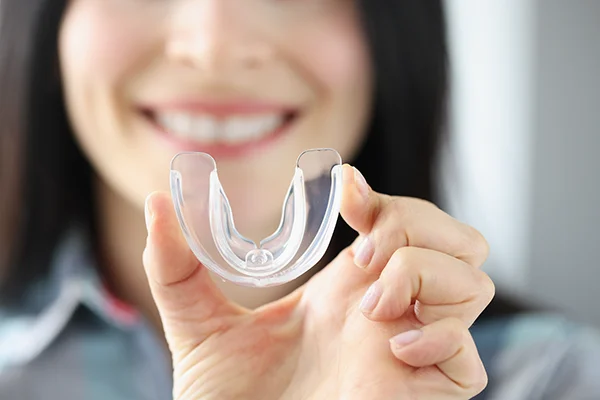Mouth Guard It is common among children and adults to clench our teeth once in a while, especially under stressful situations. But when it starts to cause headaches, tooth or jaw pain, or damage to your teeth, it's time to talk to our dentists about bruxism. The perfect treatment for sleep bruxism is a night guard, and to learn more about sleep bruxism, visit our professional dental practitioners at East Portland Dentistry. It is common among children and adults to clench our teeth once in a while, especially under stressful situations. But when it starts to cause headaches, tooth or jaw pain, or damage to your teeth, it's time to talk to our dentists about bruxism. The perfect treatment for sleep bruxism is a night guard, and to learn more about sleep bruxism, visit our professional dental practitioners at East Portland Dentistry. What is a Mouth Guard?Mouth guards are also called occlusal guards, dental guards, bite splints, or nocturnal bite plates. They are retainer-like soft or hard plastic pieces covering either the top or bottom set of teeth. Specifically, they cushion your teeth from very high destructive forces that a person is unable to control during sleep and prevent teeth from grinding together. Mouth guards can prevent headaches, damaged teeth, and inflamed gums. This is the most popular treatment for sleep bruxism. Signs and Symptoms of BruxismIf you wake up with headaches in the morning, your jaw is sore, or perhaps you have chipping, cracking or fractured teeth, these are all common signs of bruxism. Temporomandibular joint disorder (inflammation of the jaw due to clenching) and taking certain antidepressants, can also exacerbate teeth grinding. Thankfully our dentist and dental hygienist are well trained and equipped to look for signs of bruxism and give solutions to your problem. We may recommend a mouth guard to wear at night, which is an easy way to protect your teeth from damage from grinding and clenching. Childhood nighttime grinding is well documented and may continue into adulthood. As most children have permanent tooth eruption starting around the age of six, it may become necessary to protect these teeth early. Ask your dentist if you have any concerns about your child grinding at night. The Impact of Mouth Guard TreatmentA mouth guard is typically worn during sleep to reduce the impact of bruxism on your oral health. Custom-made mouthguards are available here at our office. They are of higher quality than over-the-counter mouth guards and are specially made based off of a mold of your teeth. The dentist will inspect your teeth and then send the resulting mold to a dental laboratory. The facility will then create a custom-fitted night mouth guard for you. The dentist will also check if the mouth guard fits and make necessary adjustments before you take it home. It is best to put your night guard in your mouth before you go to sleep and then take it out as soon as you wake up. It should start feeling comfortable after wearing it for four to six weeks. We advise you to wash your mouth guard before and after use and rinse it with clean, cold water or brush it with a toothbrush and toothpaste. Don't leave the night guard in a sunny spot or hot area. Store your mouth guard in a container and check it regularly for any signs of wear and tear. Contact us today and schedule an appointment with our experts through calling (971) 484-1652. |
 Phone(971) 484-1652 HoursMonday – 8:00 am - 5:00 pm Tuesday – 7:00 am - 5:00 pm Wednesday – 8:00 am - 1:00 pm Thursday – 8:00 am - 6:00 pm Friday – 8:00 am - 5:00 pm |